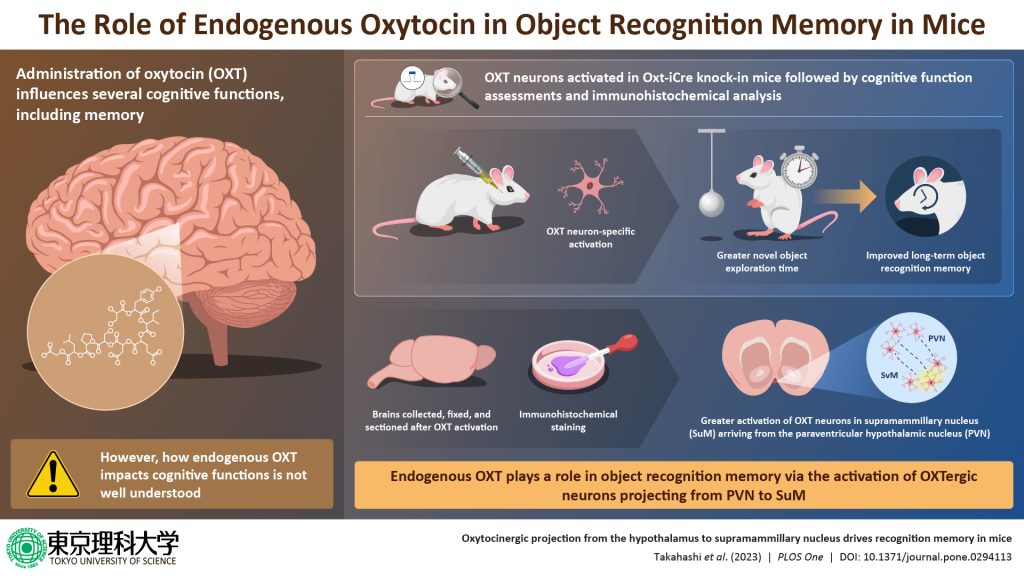TOKYO (JAPAN) — A groundbreaking study conducted by researchers from Tokyo University of Science has shed light on the significant role of oxytocin (OXT) in enhancing memory function.
Published on November 16, 2023, in PLOS One, the study reveals how activation of neurons in the supramammillary nucleus (SuM) of the mouse brain boosts performance in object recognition tasks, suggesting a crucial link between specific oxytocin neurons and memory modulation in mice.
Unraveling Neural Pathways
Oxytocin, known for its effects on psychological well-being and emotional bonding in animals, has recently been implicated in various cognitive processes, including learning and memory.
Led by Professor Akiyoshi Saitoh and Junpei Takahashi, the researchers aimed to unravel the neural pathways and signalling mechanisms underlying oxytocin’s impact on memory.
Prof. Saitoh explains that to investigate the role of endogenous oxytocin in cognitive function, they used pharmacogenetic techniques to activate oxytocin neurons in specific brain regions. The team then evaluated the cognitive function of mice using the Novel Object Recognition Task (NORT).

Insights from the NORT
The study highlights the crucial role of oxytocin in regulating social memory, with a deficiency in oxytocin or its receptors linked to abnormal social memory in mice. However, this research shifts the focus to the role of endogenous oxytocinergic projections in learning and memory, particularly within the SuM.
To pinpoint the neurons responsible for oxytocin’s effect on memory, the researchers visualized slices of the mouse brain after specifically activating oxytocin neurons in the paraventricular hypothalamic nucleus (PVN). Positive signals were observed in the PVN and its projections to the SuM, indicating oxytocin’s involvement in memory enhancement.
Advancing Research in Memory Modulation
Further experiments using the Y-maze and NORT revealed that activation of oxytocinergic neurons significantly boosted long-term object recognition memory, with increased neuron activation observed in the SuM and the dentate gyrus of the hippocampus, crucial regions for memory processing.
Oxytocin’s Role in Memory Enhancement and Dementia Prevention
This study, Prof. Saitoh says, uncovers the involvement of oxytocin in object recognition memory through the SuM, with potential implications for understanding Alzheimer’s disease. “Our research seeks to elucidate the crucial role of a stimulating environment that activates oxytocin in the brain, potentially mitigating the progression of dementia,” explains Prof. Saitoh.
The ongoing exploration of oxytocin’s role in memory modulation holds promise for innovative treatments and pharmaceutical interventions aimed at halting the advancement of dementia.
The study signifies a significant step forward in understanding the intricate relationship between oxytocin and memory function, paving the way for future research in neurological disorders and potential therapeutic interventions.

